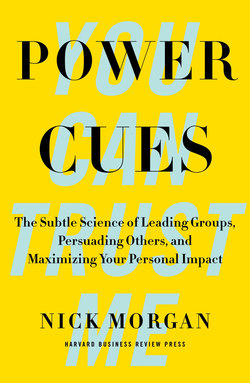Читать книгу Power Cues - Nick Morgan - Страница 28
На сайте Литреса книга снята с продажи.
Keep a Body Language Diary: Try to Catch Yourself Being Yourself
ОглавлениеTry to catch yourself in unconscious behavior. You need to know how you’re behaving when you think no one’s watching—especially you. Try not to judge yourself. Choice and change can come later. For now, just be compassionate and nonjudgmental, and try to get a picture of how you inhabit space.
Your body is the physical embodiment of your unconscious attitudes, intents, and desires. As the old saying goes, in your youth, you have the face—and body—you’re born with; by the time you’re middle-aged, you have the face—and body—you deserve. So take the sting out of that saying and simply observe yourself and learn what those observations tell you about your attitudes, intents, and desires.
Be nonjudgmental. Just notice what you do.
If you have a hard time catching yourself unawares, then think about setting up a video camera when you’re in a meeting or undertaking some routine chores. At first, you’ll be self-conscious, and your behavior will be distorted from your usual mode of being, but after a few minutes you’ll forget the camera is there. So be patient and use the video for what it can tell you about your habitual behavior, beginning a few minutes in.
As you watch, ask yourself, how am I showing up? Expressive or bottled up? Happy or sad? Active or passive? Strong or weak? What kind of person do I look like—to me? Someone who would be fun to meet? Someone imposing, or a wallflower? A nerd or a leader? And so on.
Keep a daily diary of your physical presence and emotional attitudes. Try to stick to this faithfully for about a week. Stop yourself once an hour or so and simply note what you’re doing physically—sitting straight, slouching, fidgeting, smiling, frowning, and so on. Try to be as objective and nonjudgmental as you can. The process might take a few weeks, depending on how easy or difficult it is for you.
How do your gestures show up? Do you gesture a lot? A little? Are your gestures strong or weak? Are they expressive and fluid, or rigid and limited?
If you can take personal inventory in even a moderately detached way, you can take the first step to understanding yourself as an active presence in the world and decide what you want to do about it.
If you’re having trouble being objective about yourself, then ask trusted (and supportive) family and friends to help. Ask them to rate you on a scale of one to ten for basic confidence, mood, charisma, leadership—how you show up. It’s better to ask them specific questions like, “On a scale of one to ten, how normally cheerful would you say I am?” If you ask them, “How do I show up?” they probably won’t have a helpful answer, because they’re not used to thinking consciously in this way.
Ask your friends and family, but don’t take too much stock in particular answers. Look instead for patterns. It’s very hard for us to be objective about our closest friends and family, so don’t expect too much. If you get a consistent pattern of comments across a number of people, then those observations are more likely to be accurate.
If you’re lucky enough to be a rising executive in a company that regularly conducts 360-degree evaluations, they may be extremely helpful in this regard. Once again, don’t put a lot of stock in particular comments; rather, look for patterns of comments about your usual mood, attitudes, or mode of being toward employees or colleagues. Remember, people are very good at unconsciously reading the emotional attitudes of people they know well daily.13 We recognize when Bob comes in for work in a lousy mood, or Jane is excited about something. So look for patterns where people say that you’re tough on colleagues, strong with employees, warm toward everyone, or the like. Those repeated patterns of estimations of your attitudes will tell you a lot about your physical presence, because it’s from that physical presence that people figure out your attitudes.
